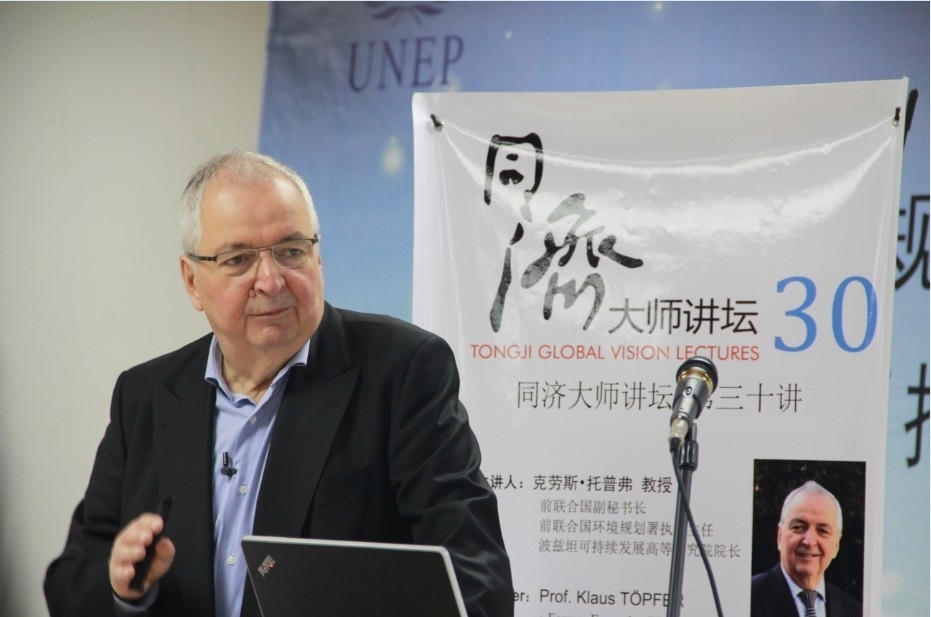On June 25-26, 2013, Klaus Toepfer, former UN Under-Secretary General and UNEP Executive Director, Executive Director of Institute for Advanced Sustainability Studies, visited Tongji University gave Tongji students and teachers three lectures on the field of energy and environment policy.
On June 25 morning, Professor Klaus Toepfer delivered a speech entitled: The Energy Change in Germany – complex challenges, great opportunities. Firstly, Professor Klaus Toepfer used a series of data to show us the challenges of current global energy consumption: 3 billion more middle-class consumers by 2030; 80% rise in steel demand (2010-2030); 147% increase in real commodity prices over the turn of the century; 44 million people driven into poverty by rising food prices in second half 2010.
Subsequently, he introduced energy supply and demand beginning with a dream that failed. Successful energy transformation to achieve the objective need to seriously consider: climate protection, security of supply, economic and social feasibility analysis; competitiveness, research and innovation, and so on. Renewable energy in Germany has a higher proportion of total energy consumption, thus enhancing the storage capacity of renewable energy needs to be resolved in the future.
In the afternoon session, Professor Pei Gang, the president of Tongji University, gave his welcom remarks to Professor Klaus Toepfer and appreciated Professor Klaus Toepfer’s contribution to the sustainability construction of Tongji University, China and world. Pei Gang excitedly introduced "Global Environment and Sustainable Development University Alliance (GUPES)" to Prof.Klaus Toepfer. And expressed that Tongji will continue the efforts in building sustainable development-oriented education, scientific research and .university.
Professor Klaus Toepfer began his lectures: Sustainable Development – past and future as the main line. He introduced efficiency, substitutability, sufficiency and Engineering. There are three dimensions of sustainable development, that is economic, social and ecological. Possibly the most important is the integration of the temporal dimension in planniung processes highlighted by von Carlowitz,. Due to his work experience in United Nations, he repeatedly stressed: Ensuring that some 9 billion people can live a decent life requires, above all, access to affordable, sustainable and reliable energy services, which are currently based almost exclusively on fossil fuel resources and unsustainable use of traditional fuel, we must seriously consider the sustainable development of energy.
On June 27, Dr. Falk Schmidt, Academic Officer of Institute for Advanced Sustainability Studies (IASS) Potsdam also delivered a lecture on Global Water Governance, which arose heated discussion among the audience. This year is also the 75th anniversary of Professor Klaus Toepfer. Students prepared birthday cake and sang the birthday song together to celebrate for this sustainable professor as he described himself. Professor Toepfer was very happy and expressed his willing to come back to Tongji next year.
